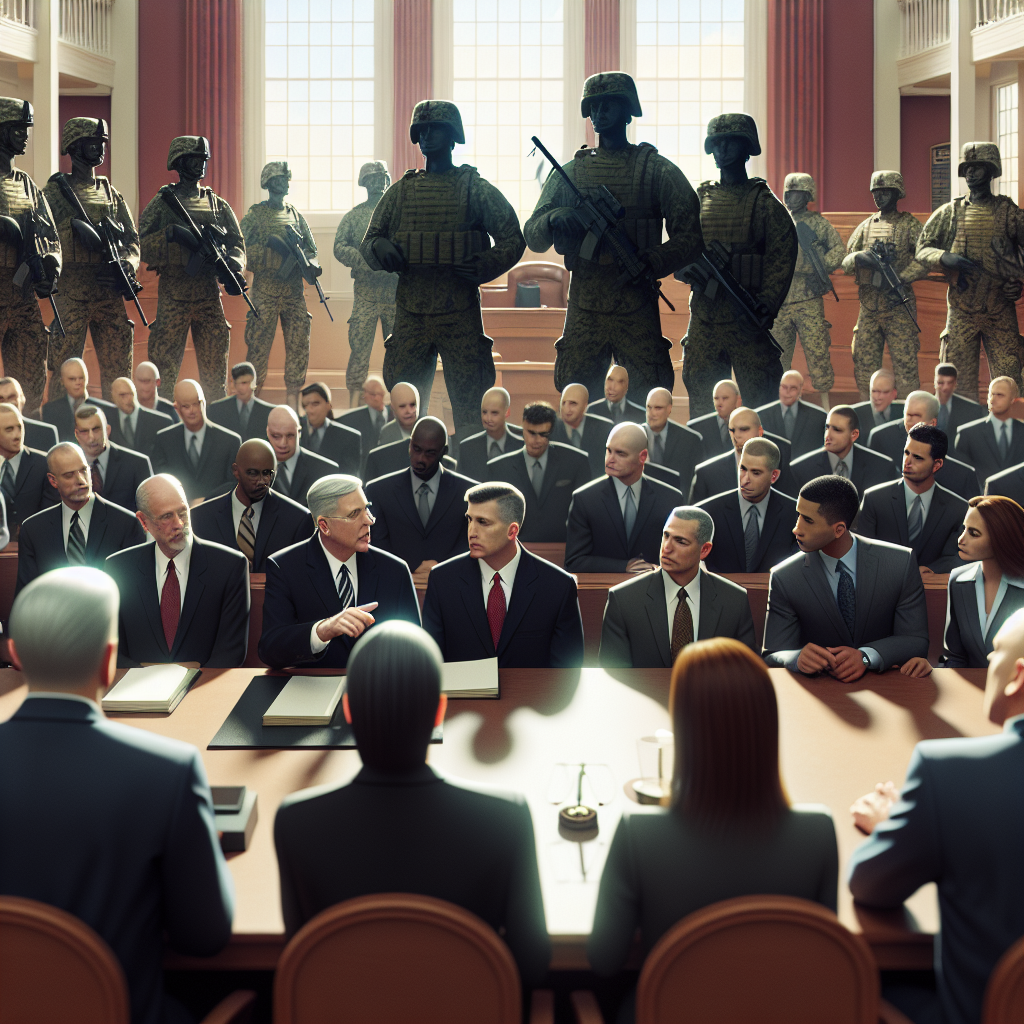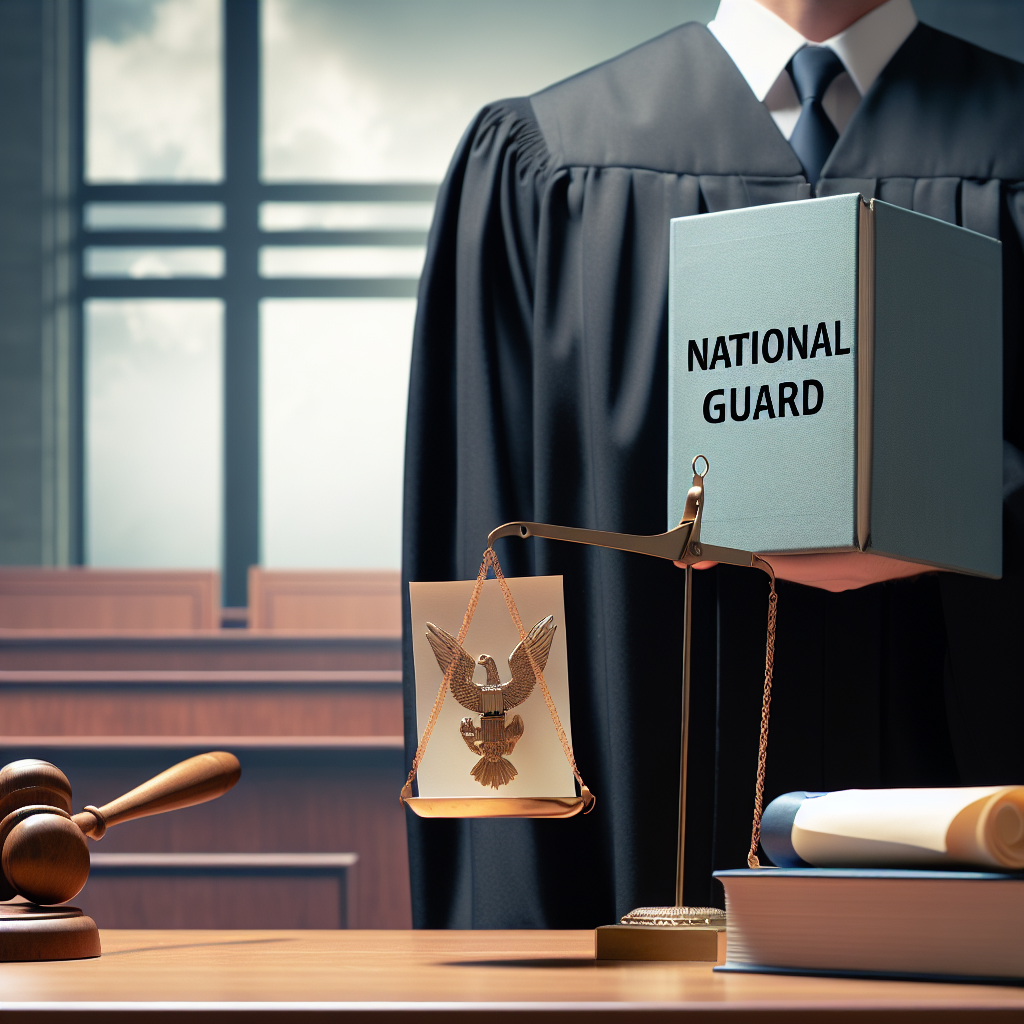The ongoing legal dispute between the Trump administration and the state of Illinois, along with the city of Chicago, centers on the deployment of the National Guard. This issue has gained prominence following President Donald Trump’s decision to authorize the deployment of National Guard members to assist in federal law enforcement efforts. The legal arguments revolve around the interpretation of federal law and the president’s authority to deploy military resources in domestic situations.
Legal Framework and Arguments
In recent filings, the Trump administration has asserted that the federal law invoked to call up the National Guard pertains to civilian law-enforcement officers rather than the military. U.S. Solicitor General D. John Sauer contends that the law allows the president to deploy the National Guard when the regular forces cannot effectively execute federal laws. This interpretation is critical as it challenges the notion that only the full-time military can be utilized in such situations. The administration argues that the courts should offer “extraordinary deference” to the president’s judgment in this matter.
Conversely, attorneys representing Illinois and Chicago have countered this interpretation, claiming that the term “regular forces” explicitly refers to the full-time, professional military. They have urged the Supreme Court to uphold a lower court’s ruling, which restricts the president’s ability to deploy the National Guard without demonstrating that the regular military forces are unable to execute federal laws in Chicago. This legal battle raises significant questions about the separation of powers and the extent of presidential authority in domestic law enforcement.
Key Legal Points Raised
- Interpretation of “regular forces” in federal law
- Authority of the president to deploy the National Guard
- Deference of courts to presidential decisions
- Implications for state versus federal power
The legal briefs submitted by both parties illustrate the complexity of the situation. The Trump administration’s stance highlights its belief in the necessity of deploying the National Guard to address public safety concerns, particularly in the context of federal immigration enforcement. On the other hand, the state of Illinois and the city of Chicago emphasize the need to maintain a clear boundary regarding the use of military forces in civilian law enforcement, arguing that the president has not met the burden of proof required to justify such a deployment.
As the case progresses, the implications of the Supreme Court’s decision could set a significant precedent regarding the use of the National Guard in domestic issues. The outcome will likely influence not only the current situation in Chicago but also future interactions between state and federal authorities concerning law enforcement. The legal community is closely monitoring this case, as it could redefine the boundaries of executive power in domestic affairs, particularly regarding the national guard deployment.
Background of the Deployment Decision
The deployment of the National Guard to Chicago was authorized by President Trump in October, following rising tensions and public safety concerns. The administration’s decision was met with immediate legal challenges from state officials, who argued that the deployment was unnecessary and potentially unconstitutional. They claimed that adequate law enforcement resources were available through the regular military, which should be the first line of defense in such situations.
In light of these challenges, the federal court’s ruling to restrict the deployment has added another layer to the ongoing legal battle. The state of Illinois and the city of Chicago contend that the administration has failed to demonstrate a genuine need for National Guard intervention, particularly when the regular military forces are capable of fulfilling this role. This argument hinges on the interpretation of the law and the president’s obligations to justify military action.

The ongoing legal discourse highlights the tensions between federal authority and state sovereignty, particularly in matters of public safety and law enforcement. As the situation develops, further legal interpretations and rulings will likely shape the future of National Guard deployments across the country, with potential ramifications for the DOJ integrity team and its oversight of federal actions.
The ongoing legal battle between the Trump administration and the state of Illinois, along with the city of Chicago, has emerged as a significant constitutional issue regarding the deployment of the National Guard. Central to this dispute is the interpretation of federal law that allows the president to call up the National Guard under specific circumstances. The complexity of the arguments presented by both sides highlights the tension between federal authority and state rights concerning law enforcement and public safety.
Legal Arguments Surrounding the Deployment
On a recent Monday afternoon, the Trump administration, alongside its legal representatives, submitted additional briefs to the Supreme Court. This was in response to an order requiring clarification on the interpretation of the term “regular forces” within the federal law invoked by President Trump. The administration contends that this term refers to civilian law enforcement officers, not the U.S. military. U.S. Solicitor General D. John Sauer emphasized the need for courts to provide “extraordinary deference” to the president’s decision to deploy the National Guard in situations deemed necessary for federal law enforcement. This assertion underscores the administration’s stance that the deployment was justified under the circumstances surrounding immigration enforcement in Chicago.
In contrast, lawyers for the state of Illinois and the city of Chicago argue that the phrase “regular forces” explicitly refers to the full-time, professional military. They maintain that the Trump administration has failed to demonstrate a valid reason for deploying the National Guard instead of the U.S. military. Their legal briefs urge the Supreme Court justices to uphold a federal judge’s order that bars this deployment, asserting that the president must first prove he could not execute federal law using the regular military forces. This argument pivots on the interpretation of the law and the extent of executive power, which is a crucial aspect of the ongoing litigation.
Implications of the Legal Dispute
The legal proceedings reflect a broader conflict regarding executive power in the context of domestic law enforcement. The Trump administration’s decision to deploy the National Guard to Chicago in October raised significant concerns among state officials. After President Trump authorized the deployment of 300 National Guard members to assist with law enforcement, the state and city quickly challenged that decision in federal court. This move was seen as a direct confrontation of state authority, with implications for how federal and state governments interact when public safety is at stake.

The case also raises questions about the interpretation of federal laws governing the use of military forces in domestic situations. As the Supreme Court considers the arguments presented by both sides, the outcome could set a precedent for future interactions between state and federal authorities. Legal experts have noted that the implications of this case extend beyond Illinois, as the interpretation of federal law could influence similar deployments across the country. This ongoing legal battle represents not just a clash of legal interpretations but also a significant moment in the ongoing dialogue about the limits of presidential power and the rights of states to govern their own affairs.
As the legal arguments unfold, it is essential to monitor how the Supreme Court will interpret the law regarding the deployment of the National Guard. The outcome may hinge on nuanced interpretations of terms and the broader implications of federal authority. The Trump administration’s push for deployment, juxtaposed with state resistance, encapsulates the complexities of governance in a divided political landscape. The supreme court intervention in this matter will likely influence not only this specific case but also future legal frameworks surrounding the use of military forces in domestic law enforcement.
Furthermore, the legal discourse surrounding this issue is becoming increasingly relevant as more states grapple with similar challenges. The interpretation of the term “regular forces” could redefine how states interact with federal authority in times of crisis. As the Trump administration and state lawyers continue to present their cases, the legal community watches closely, aware that the implications of this case could resonate for years to come. The ongoing discussions about section three disqualification and the balance of power between state and federal governments will be crucial in shaping future legal precedents.
Moreover, the court’s decision will also reflect broader societal concerns regarding the militarization of law enforcement and its impact on civil liberties. The implications extend to how such deployments are perceived by the public and the legal ramifications that follow. As the case progresses, the potential for a ruling on the legality of Trump’s actions could have far-reaching consequences, not only for the state of Illinois but for the entire nation. Legal analysts are keenly aware of the potential for this case to influence future discussions about trump's tariffs court case and the overarching theme of executive power in America.
The ongoing legal battle between the Trump administration and the state of Illinois, along with the city of Chicago, reflects a significant constitutional debate regarding the deployment of the National Guard. This conflict centers around the interpretation of federal law that governs the president’s authority to call upon the National Guard for domestic purposes. With the stakes high, both sides have presented their arguments to the Supreme Court about the definition of “regular forces” and the president’s discretion in utilizing the National Guard in situations of civil unrest.
Legal Arguments Presented
The Trump administration has taken a firm stance, asserting that the term “regular forces” should not be confined to the U.S. military alone. U.S. Solicitor General D. John Sauer emphasized that the law encompasses civilian law enforcement, suggesting that the National Guard can be deployed as a necessary measure to maintain order. He argued that the president deserves “extraordinary deference” when making such determinations, particularly in light of the challenges posed by violent resistance to federal immigration enforcement. This perspective underscores a broader interpretation of federal authority during times of crisis.
In stark contrast, the legal representatives for Illinois and Chicago assert that the phrase “regular forces” explicitly refers to the professional military, thereby limiting the president’s options to deploy the National Guard without sufficient justification. They contend that the administration has failed to demonstrate the necessity of calling up the National Guard, particularly when the U.S. military could potentially fulfill the same role in enforcing federal law. This argument is not only a legal technicality but also a significant assertion of state rights and local governance over federal actions.
Implications of the Supreme Court’s Decision
The Supreme Court’s eventual ruling on this matter will have far-reaching implications for the balance of power between state and federal authorities. Should the court side with the Trump administration, it may set a precedent for broader presidential powers in deploying the National Guard during domestic unrest. Conversely, a ruling favoring Illinois and Chicago could reinforce the limitations on federal authority and enhance the autonomy of state governance during emergencies.
As the legal arguments unfold, the ramifications extend beyond the immediate deployment of National Guard troops; they touch upon fundamental issues of governance, civil liberties, and the interpretation of federal authority. The outcome may influence not only future engagements of the National Guard but also the broader relationship between state and federal governments in times of crisis. For those interested in the intersection of law and executive power, the situation highlights the critical need for clarity on the interpretation of federal statutes regarding military deployment.
In the midst of this legal struggle, it is essential to monitor how the Supreme Court will address the complexities surrounding the deployment of the National Guard. The court’s decision could potentially reshape the landscape of federal intervention in state matters, particularly in urban areas facing unrest. Observers are keenly watching for any developments that may arise from this case, especially as it relates to the recent snap funding intervention and other federal actions that test the limits of executive power.